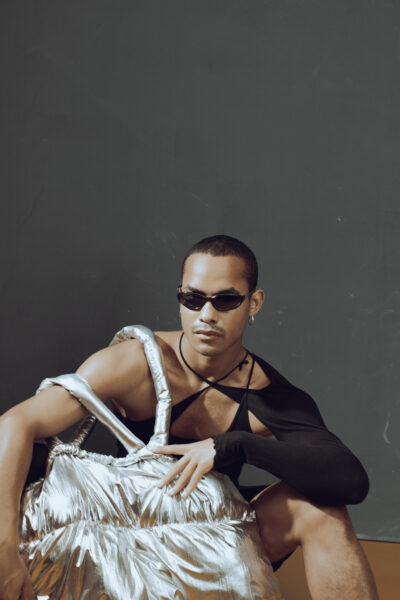I meet Lie Ning ten days after the release of their long-awaited debut album Utopia, and the Berlin-based artist is still deeply moved by the overwhelmingly positive feedback – yet I’ve rarely met a person who seemed so equipped for success. Are they aware of being called “Germany’s next big Pop Dream”? To that they only laugh, nothing they feel pressured by. “I would love it if people would open a window on a sunny spring day, lie down on the floor and just listen to the vinyl from top to bottom”.

Lie Ning‘s album sounds soft, full of emotion, and sultry, but not without a certain edge. Receptive sounds with references to many genres and eras. The songs take you through the day from melancholic breakdowns on the kitchen floor to euphoric outbursts under the disco ball, or vice versa. Lie Ning effortlessly conducts energy between those spheres. As a true Berliner, they admit their love for techno, but after two nights of intense dancing, they start craving slower melodies. This supposed contrast led them to create song ideas even in the toilets of Berghain. Songs that are made to catch you when you are back home and life slows down again.
“I want to make pop music, but I also like to deviate from it, because pop music allows that in a different way than other genres. The premise is still that there is a chorus, that there is a structure that is somehow comprehensible and melodies that are not too complex. And that interests me because it’s something that a lot of people can understand“.
But just because it is suitable for the mainstream doesn’t mean it lacks depth or versatility. Mixing contemporary elements from electronic music with old-school soul sounds, the album ranges from big Hollywoood-esque ballads to catchy disco hits. The lines between musical genres are amongst the many boundaries Lie Ning breaks. Against the trend of beats and background music becoming louder than the vocals, they deliberately emphasize their velvety voice. And of all their releases, Utopia is their biggest statement.
Positive Change Through Music
The songs on Utopia are full of love, euphoria and passion, nothing about Lie Ning is an understatement. beautiful hypes you up, i see you catches and holds you when you fall, offline encourages you to be your most authentic self. There are stories of beauty and love, but not without some detours into toxic relationships. The album is an invitation to compassion and radical love. And even if it might not always be recognised as such, Utopia is a deeply political album. With a background in cultural studies and political activism, Lie Ning has always been interested in big social and political questions. They now use their art to break down complex topics and transmit their messages through the senses. Debates on important socio-political issues are often extremely emotionally charged, although expected to be detached from any subjective experiences or feelings. Instead of chasing the impossible goal of objectivity, Lie Ning distills and emphasizes these very emotions.
„I went into the [songwriting] sessions with incredibly complex topics, with many theories that I brought in from cultural studies. But my goal was always to boil it down to pure emotion and make it comprehensible.“
While the success of big Gen Z stars like Billy Eilish may be based on their ability to voice their generation’s heavy feelings of powerlessness, Lie Ning is missing ideas for change and hope. The utopia of their album is compassion and positivity in everyday interactions, as they believe that will create a ripple effect that leads to a better world for everyone. It is a phenomenon we all know from our daily lives: You start the day off on the wrong foot, but a simple friendly encounter with the barista at the coffee shop can easily lift your mood.


Inspiring Hope
Lie Ning‘s music seeks to inspire hope and positive change in a world that can often feel overwhelming and negative. Even though their songs are bursting with emotions, they don’t use their music as a tool to process their own feelings. „My approach is definitely to give hope, and I can’t do that if I haven’t worked through my issues beforehand“, they add. Rather, they have chosen to collaborate with others to create carefully constructed narratives with multiple perspectives.
Despite many challenges, Lie Ning credits their strong support system and an open feedback relationship with their team for their ability to navigate life and the industry with a strong mental state. Something they developed early on: the singer grew up in Berlin in a communal housing project with 25 people, where they had to learn quickly to find and express their own personality and desires. Being Black, queer and growing up in that setting, they had grown a thick skin early on. Experiences, both negative and positive, that made them the self-assured person they are today. In their presence, you can feel their radiating confidence, which allows them to be fully present and pay attention to the smallest details. However, they are aware that not all young artists have the same support and can fall prey to oppressive contracts. Not to mention the negative impact that industry pressure can have on mental health.
Berlin’s Music Industry Needs to Catch Up
That being said, Lie Ning’s pathway into the music industry hasn’t been easy either. Only now, after some years of making music, they feel like they are actually entering the business. Looking back, the artist realizes how white colleagues were able to get access to spaces long before they gained public interest. Especially at the beginning of their career, they faced many uncomfortable to inappropriate situations. They had to go through conversations about downplaying or even hiding their sexuality. Early on, they realized their important role as representative of their community, something they wouldn’t allow to be diminished.
It was only when they found their collaborators for Utopia, that they felt their message was truly understood. In a predominantly white male industry, they sought out BIPoC, queer and/or female collaborators who shared experiences of discrimination and marginalization. This helped to create a safer environment where they didn’t have to explain themselves and could create freely. For the recordings, Lie Ning went to London, where it is easier to build a team of Black and queer artists than it is in Berlin.
Building Community
The artist points out that queer and especially trans people of Color still face discrimination, violence and microaggressions on a regular basis. There is a lot of work to be done. Despite all, Berlin is still where Lie Ning feels at home. Where they can walk around more freely than elsewhere, they tell me while showing off their periwinkle-heeled boots. “I love Berlin. Berlin is such a beautiful city. But with a few exceptions, there are hardly any good songs about Berlin. There are only trashy songs, while there are such iconic songs about Paris and New York. Why is that? I think Berlin is often misunderstood. It can be a very welcoming space – if you find the right people”.
Although the local music industry is slow to pick up on what’s going on in its scenes, there is no shortage of creativity and talent in the city. Still, many of the city’s amazing artists and producers receive neither enough recognition nor support. Lie Ning hopes to see not only more funding for a wider range of projects but also a certain fearlessness to experiment with new approaches and ideas. Until the industry catches up, Lie Ning stresses the importance of building communities and supporting each other. Something that feels more necessary but also easier to do in Berlin than in the big, fast-paced scenes of cities like London or New York. And with this call for community and mutual empowerment, everything comes full circle to Utopia.
Utopia is out now via Neubau/The Orchard.
All photos by Anika Zachow.



